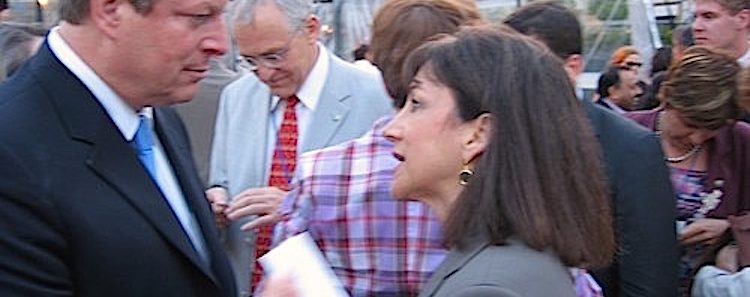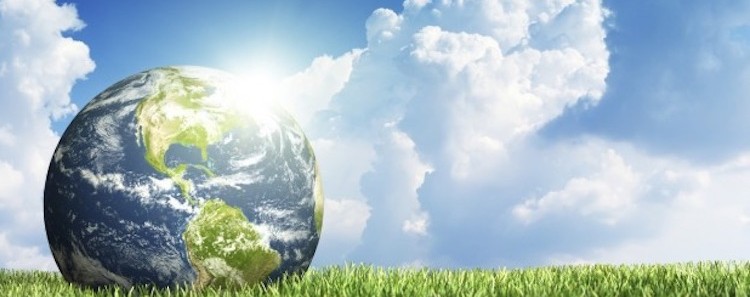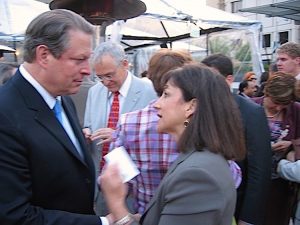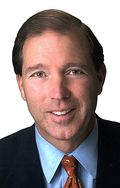Author Archives: Betsy Rosenberg
After all the Accolades Some Inconvenient, Inexplicable and Inexcusable Truths Still Remain
- Wednesday, 08 June 2016 22:01
- Written by Betsy Rosenberg
- 0 Comments

Happy Earth Day America – Time to Get Off Our Gasses!
- Friday, 22 April 2016 21:51
- Written by Betsy Rosenberg
- 0 Comments

As I write this on the eve of the 46th anniversary of the first Earth Day, held on April 22nd, 1970, a “500 year flood” in Houston has already destroyed 1,000 homes and taken at least eight lives. In the television video of people wading through waist deep water appearing in the same moment to be both grateful to be alive and stunned by the devastation surrounding them, I’m reminded of scenes from a film I saw last night about the effects of climate change around the world, including victims from Hurricane Sandy. And yet here it is again, playing out like some slow motion disaster movie. Once again, it appears the homes destroyed were primarily those inhabited by the less fortunate, perhaps in structures built long ago or lacking adequate maintenance.
Even as I’m flying home to San Francisco from a week in New York, watching CNN, the coverage of election news and Texas flooding has been bumped, due to the sudden death of Prince. Of course “breaking news” always “trumps” everything else, and perhaps as it should be. But already into hour four of Prince coverage and the human toll in Texas has been sidelined. And tomorrow is Earth Day. Yet if past years are any indication there will be little, if token, coverage on this one day of the year when Americans are supposed to pay attention to our environment, at least in theory.
Being among the climate obsessed, the plight of our imperiled planet is never far from my mind. In fact I saw two excellent shows on the topic of global warming, now called by most, more accurately, climate change, this past week.
First the Rap Guide to Climate Chaos with the brilliant BaBa Brinkman. The fast talking rapper was on stage for 90 rousing, riffing minutes on the biggest existential challenge of our time. Like Al Gore ten years prior, Brinkman uses slides showing devastation and scary scientific graphs to back up his words with urgency and frightening poignancy.
But Brinkman, who happens to be Canadian, does not leave his audience depressed, at least not anymore so then what’s appropriate. He devotes at least the last third of his emotional roller coaster of a show to the solutions side, the what can we do about it part, though he even has some fun poking fun at himself jetting around the world to perform his one man show about what our gasses are doing to the climate.
And I myself am on a spanking new Virgin Airways jet spewing emissions as people movers always do, so we’re all clearly part of this system whether we like it or not.
Never mind that I was in New York pitching a few news networks, including CNN, on the concept of a dedicated program focused on our environmental challenges and solutions, with a heavy focus on the urgent climate crisis. Maybe a little “guilt offset” if not a carbon offset for my cross-country travels.
But back to Brinkman, who devoted 15 minutes to audience Q and A with an expert called onstage to answer inquiries, on that evening it was a science professor from nearby Columbia University. If you’re in the NYC area this Earth Day weekend I urge you to see it!
Then last night, exactly ten years after attending a screening of An Inconvenient Truth with Al Gore doing Q and A after that pivotal film, I watched an equally well- done movie about the impacts of climate change, this time with Josh Fox. The director of Gasland and Gasland 2, which famously depicted water catching fire as it came out of faucet in fracking country, where Josh grew up. He, along with actor “fractivist” Mark Ruffalo, have helped put the controversial gas extraction process on the map.
After the screening Fox, flanked by his production team on stage, took questions from the audience. In his responses he explained that the Gasland films inevitably pointed to the need to take on the larger climate crisis and so his intrepid crew and camera set out on a voyage to “hot spots” around the world.
He doesn’t just share the devastation; from strip mining to oil spills in the Amazon rainforest, to gas mask wearing children in smog choked Beijing whose residents monitor daily pollution levels and plan their daily activity around it, like we check the weather.
In fact there’s a parallel theme reflected in the film’s title – How To Let Go of the World and Love What Climate Can’t Change – of how a warming world is also a potential unifying force, a common enemy community builder unlike any other. He takes us to villages where there is no electricity and shows what the introduction of solar lamps can do for students who can further their education by being able to study in evening hours. He takes us to Zambia where villagers have neither running water nor electricity. And to the sinking island of Vanuatu whose inhabitants feel “rich” because the 100,000-plus acres they live on provides everything they need to stay alive. But they also show how the natives need each other to survive and how — whether step dancing in unison or sharing tribal stories with wisdom passed down through generations – they have a deep sense of place, tradition and belonging, coincidentally the same qualities lacking in many modern cultures, like ours, where–despite all of our stuff– many Americans feel empty, alienated and lacking purpose.
To his credit Fox does not glorify a more austere past or more primitive cultures, but rather juxtaposes the atmospheric fallout from “developed nations” with the cultures who have “developed their spiritual sides,” but still often the very same people most adversely affected by destructive storms and rising seas.
The movie uses music as a thread throughout, opening with Fox dancing in his living room over a fracking victory and concluding with a gorgeous original song with poignant visuals of two young girls doing ballet on the beach where their Long Island community was devastated by Hurricane Sandy in 2012. The girls, who became close friends after their families met by helping each other in the chaotic aftermath of the killer storm, were present at the screening, adding an extra note of poignancy.
In the beginning of the film climate activist and author Bill McKibben is among the experts interviewed by Fox. They are having a conversation in a Capitol Hill food court with more lights blazing than a Vegas casino. Before finishing they’re asked to leave by a security guard who declares the eating area closed (so why are there enough lights burning overhead to heat the room?) McKibben looks into the camera and dramatically utters words I’ve heard him say before but bare repeating; “we are living on a changed planet,” an Earth so different that McKibben named his 2010 book Eaarth, deliberately misspelled to reflect a new home with an unknown future.
An hour into my flight we learned, via sky TV and CNN, that Prince had died suddenly this morning. When we landed in San Francisco the coverage was still wall to wall Prince and likely will be tonight and throughout much of tomorrow, Earth Day. No slight against Prince, who clearly was a gifted musical genius, and it’s always shocking when someone dies “young,” but in the end how many people does that development, sad as it may be, truly impact? Five hours into the non-stop coverage Prince is still dead and more than 1,000 lives have been forever changed in Houston. And the rain continues to fall in Texas (but no it’s not Purple).
And the planet formerly known as Earth continues to die a little more each day whether or not CNN– and the other big news outlets– cover it, connect the dots, or even consider offering dedicated coverage on what we’re going to do about this crisis.
So I ask where I began this essay, isn’t it time that we begin to get off our gasses?
Or at least start a national conversation on a major news network about how we’re going to do that? There will always be “breaking news” that bumps a breaking climate we need dedicated programming, “appointment TV” as they call it in the biz, where you can tune in at a certain time, preferably daily, and get all your questions and concerns about our planetary pickle(s) addressed by experts in their field who are not only knowledgeable, but passionate and gifted communicators.
And if you don’t have any questions or concerns about our changing environment, how it’s affecting humans, animals and nature–and what we can do about it–then you haven’t been paying attention. And if, as a society, we continue to focus on the sensational rather than the scientific, well then perhaps we deserve what’s coming. Because we have a choice and the television news networks have a choice. To be responsible adults and face our challenges or turn away and “face the music.”
Of course we will miss Prince’s unique brand of music, and activism, but his legacy will live on with his songs and wide influence. Friday is Earth Day and we should spend at least a few minutes pondering the ecological legacy we are leaving our children. And consider letting your favorite TV networks know you’d like them to include news about our breaking planet in the daily mix, including ideas for a fix.
NASA Climate Scientist Dr. James Hansen
- Wednesday, 26 March 2014 18:05
- Written by Betsy Rosenberg
- 0 Comments
 After ten years interviewing the best and the brightest in the environmental and climate community,time to say farewell to "The Green Front" on PRN with Dr. James Hansen, the pioneering former NASA scientist who has become one of the world's most powerful voices urging action to confront the calamity of carbon pollution.
After ten years interviewing the best and the brightest in the environmental and climate community,time to say farewell to "The Green Front" on PRN with Dr. James Hansen, the pioneering former NASA scientist who has become one of the world's most powerful voices urging action to confront the calamity of carbon pollution.
Michael Brune: Where we need to go next
- Wednesday, 26 March 2014 17:55
- Written by Betsy Rosenberg
- 0 Comments
 We also speak with another leader in the climate movement–Michael Brune. The Executive Director of The Sierra Club joins us with his thoughts on where we need to go next.
We also speak with another leader in the climate movement–Michael Brune. The Executive Director of The Sierra Club joins us with his thoughts on where we need to go next.
Tom Udall: climate crisis in New Mexico
- Wednesday, 19 March 2014 20:17
- Written by Betsy Rosenberg
- 0 Comments


